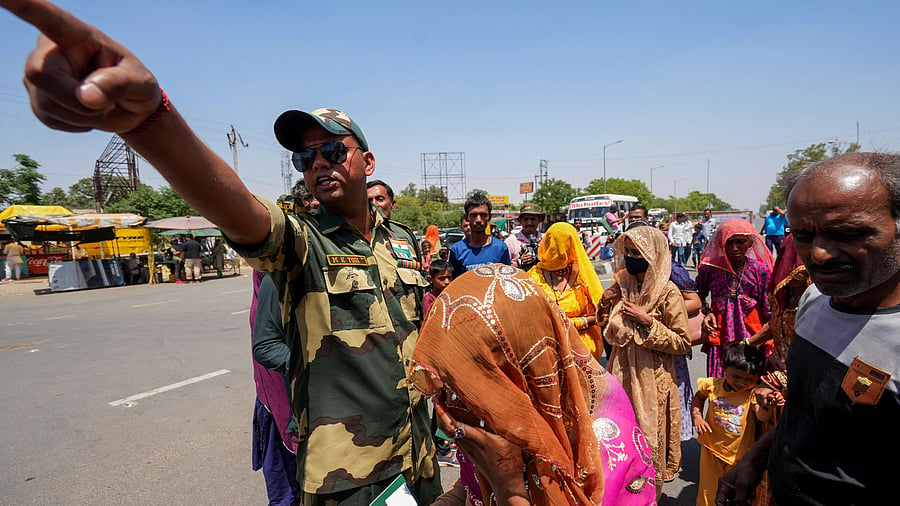
A BSF personnel guides Pakistani nationals arriving to cross over to their country as the deadline to exit India nears its end, amid escalating tensions between the two countries over the Pahalgam terror attack, at the Attari-Wagah border point, near Amritsar, Sunday, April 27, 2025.
Credit: PTI Photo
In the aftermath of the recent Pahalgam terrorist attack in Jammu and Kashmir that claimed 26 lives, in which Indian authorities suspect Pakistan's hand, the Modi government has taken strong measures against its troublesome neighbour, including the revocation of 14 categories of visas previously granted to Pakistani nationals.
The visa revocations took place in a staggered manner, with SAARC visas expiring on April 26, medical visas expiring on April 29, and all other visas expiring by April 27.
The visa revocation, which has taken hold, is part of a broader strategy by India to address security concerns and reassess bilateral engagements with Pakistan in the wake of the massacre in Pahalgam.
The following visa types have been cancelled:
SAARC Visa – Issued under the South Asian Association for Regional Cooperation framework.
Visa on Arrival – Previously available to Pakistani citizens over 65 years for visits to meet friends or family.
Business Visa – For commercial and trade-related activities.
Film Visa – Granted for film production purposes.
Journalist Visa – For media personnel.
Transit Visa – For short stays while transiting through India.
Medical Visa – For individuals seeking medical treatment.
Conference Visa – For attending seminars and conferences.
Mountaineering Visa – For mountaineering expeditions.
Student Visa – For academic pursuits.
Visitor Visa – For personal visits.
Group Tourist Visa – For organised group tourism.
Pilgrim Visa – For religious pilgrimages.
Group Pilgrim Visa – Specifically for minority communities undertaking group pilgrimages.
Union Home Minister Amit Shah has directed state Chief Ministers to enforce the immediate revocation of these visa categories and ensure the departure of affected individuals by the specified deadlines.
Pakistani nationals who fail to exit India by their respective deadlines also face hefty fines and imprisonment.
What about long-term visas (LTVs)?
Barring the above, diplomatic, official and long-term visas (LTVs) will still remain valid, and will also be handed out to certain categories of Pakistani nationals who arrive in India with valid passports and an intention to settle and attain Indian citizenship.
Members of minority communities in Pakistan, namely Hindus, Sikhs, Buddhists, Jains, Christians, and Parsis, will be eligible for such LTVs, as will Pakistani women married to Indian nationals living in India, and Indian-origin women of Pakistani nationality married to Pakistani nationals and returning India due to divorce/widowhood or other similar circumstances.
In the above cases, LTVs valid for 5 years at a time may be granted, but in cases of visas granted out of extreme compassion, LTVs will only be granted for 1 year.
